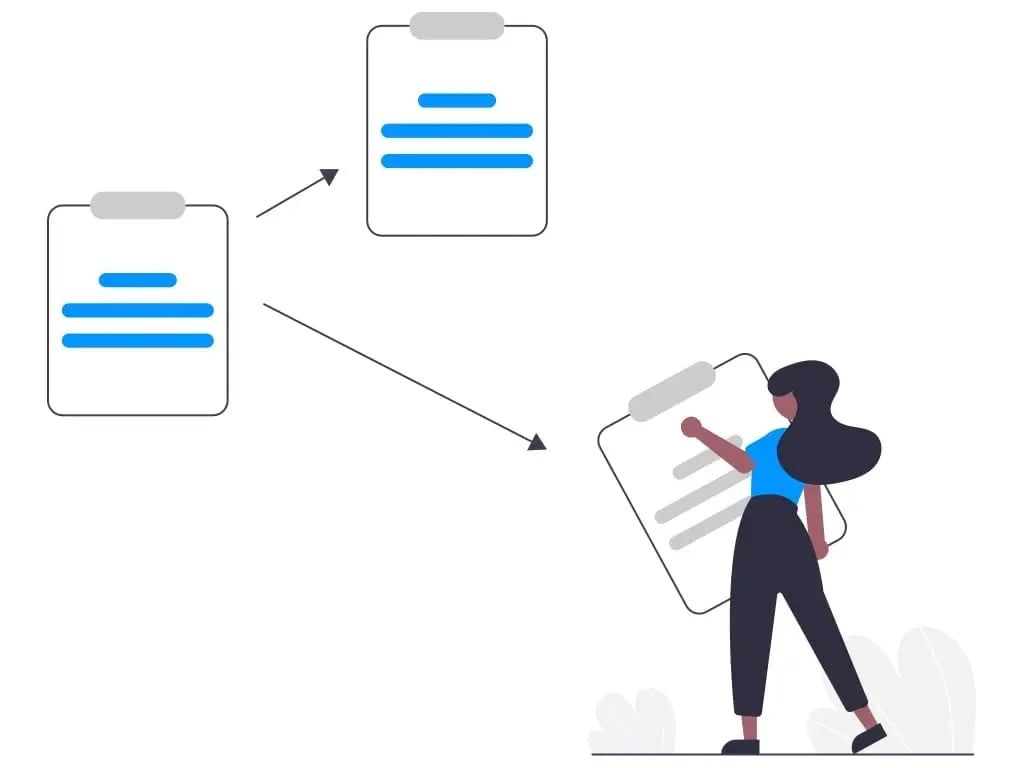
In a landscape in which customer experience is paramount, call queues are an important feature for any business that receives a high volume of calls. They help ensure that all customer inquiries are addressed and provide a better experience for both customers and agents.
What is a Call Queue?
A call queue, also known as a waiting queue, is a feature used in call center and business phone systems that place an incoming call in a virtual queue when all agents are currently busy with other calls. The caller hears recorded messages or music while waiting for an available agent to become free.
The queue ensures that incoming calls are not lost and that each caller is handled in the order in which they called. Some call queue systems also have features such as estimated wait times and the ability to offer callers the option to leave a voicemail or receive a callback instead of waiting on hold.
How Does Call Queueing Work?
Step 1. Call comes in: A call queueing system begins when a call comes in and all agents are currently busy with other calls.
Step 2. Call placed in queue: The call is placed in a queue or waiting line until an agent becomes available. The caller is informed that their call is important and will be answered in the order in which it was received.
Step 3. Callers hear message or music: While the caller is waiting in the queue, they may hear a recorded message or music to keep them engaged and informed.
Step 4. Agent becomes available: When an agent becomes available, the next call in the queue is automatically routed to that agent.
Step 5. Agent answers the call: The agent answers the call and begins assisting the customer.
Step 6. Call ends: When the call is complete, the agent is available to take another call, and the call queueing system repeats the process for any remaining calls in the queue.
Why is Call Queueing So Important For Business?
Call queue software is an important feature for any business that receives a high volume of calls. They help ensure that all customer inquiries are addressed and provide a better experience for both customers and agents.
1. Ensures that no calls are lost
Call queues ensure that every call is answered and attended to, even during high call volumes. This reduces the likelihood of missed calls and ensures that all customer inquiries are addressed.
2. Reduces wait time
The call queueing system help reduce the amount of time customers have to wait on hold by providing them with an estimated wait time and the option to leave a voicemail or receive a callback. This can improve customer satisfaction and reduce frustration.
3. Increases agent efficiency
Call queues help manage call volumes and ensure that agents are not overwhelmed with too many calls at once. This can help agents remain focused and provide better service to customers.
4. Improves customer experience
By providing customers with an organized and structured system for waiting on hold, call queues can help improve the overall customer experience. This can help build customer loyalty and increase the likelihood of repeat business.
What is Call Queue Management?
Call queue management is the process of efficiently managing incoming calls that are placed in a queue or waiting line when all agents are busy handling other calls. It involves the use of call center software or phone systems that can automatically route calls to available agents and provide callers with estimated wait times and other information while they wait on hold.

It's super easy to switch to an alternative product or service. Access to competitor information via the internet has been shaping customer behavior over the past decade, and customer expectations have increased as a result. It's up to you to meet them.
Nowhere is this more clear than in your call queues. Expectations of an instant (within five minutes) response have risen across all channels over the course of the pandemic. Now, 33% of customers expect an instant response over the phone. Meanwhile, 50% think that long wait times are the most frustrating aspect of a poor customer experience (CX).
In other words, call queuing software and how you manage your call queues can greatly affect your relationships with customers. If you regularly leave people on hold for long periods of time, don't be surprised if they look elsewhere. And, in an economically uncertain environment, customer retention is essential for businesses that want to thrive.
Why Is It Important For Business?
Call queue management is an essential part of any call center or business that handles a high volume of incoming calls. By efficiently managing incoming calls, businesses can improve the customer experience, increase efficiency, and make data-driven decisions to optimize their call center operations.
Improved customer experience
Call queue management helps ensure that callers are handled in an organized and efficient manner, reducing wait times and providing them with the information they need while they wait on hold. This can lead to a better overall customer experience and improved satisfaction.
Increased efficiency
Queue management allows businesses to handle incoming calls more efficiently, which can improve the productivity of call center agents and reduce wait times for callers. This can help businesses save time and money by reducing the need for additional staff or equipment.
Better call prioritization
Queue management systems can prioritize certain types of calls, such as urgent or high-priority calls. This ensures that these calls are handled first, which can be critical in situations where immediate attention is needed.
Real-time monitoring
Call queue management software typically provides real-time monitoring and reporting, allowing businesses to track call volume, wait times, and other important metrics. This can help businesses identify areas where improvements can be made and make data-driven decisions to optimize their call center operations.
How Can You Manage Call Queues More Effectively?
Ideally, you'd answer all your callers immediately, but everyone understands that sometimes this isn't possible.
Effective call queue management requires a combination of careful planning, ongoing monitoring, and data-driven decision making. By prioritizing the customer experience, optimizing agent availability, and using call queue management software and analytics, you can ensure that your call center operates smoothly and efficiently
1. Set Realistic Expectations
Be transparent with your callers about expected wait times and provide updates if wait times change. Setting realistic expectations can help reduce frustration and improve the customer experience.
2. Monitor Call Volume
Monitor your call volume to ensure that your call queue system can handle the number of incoming calls effectively. If call volume exceeds capacity, consider adding additional agents or optimizing call routing to avoid long wait times.
3. Prioritize Calls
Use call queue management software to prioritize certain types of calls, such as urgent or high-priority calls, and ensure that they are handled first.
4. Optimize Agent Availability
Ensure that agents are available to take calls when they are needed. This may involve scheduling shifts, cross-training agents to handle multiple types of calls, or using skills-based routing to route calls to agents with the appropriate skills and experience.
5. Monitor Wait Times
Monitor wait times to identify potential bottlenecks or areas where improvements can be made. Make data-driven decisions to optimize your call center operations and improve the customer experience.
6. Use Call Recording and Analytics
Use analytics and call recording software to monitor the quality of calls, identify areas where agents may need additional training or support, and gather data to inform future improvements.
Related: 12 Best Practices for Call Queue Management
What Causes Long Call Queues?

High call volume: If the call center is receiving a high volume of incoming calls, it may result in long wait times for customers in the call queue.
Insufficient staffing: If the call center is understaffed, there may not be enough agents available to handle the volume of incoming calls, resulting in long wait times for customers in the call queue.
Inefficient call routing: If the call routing system is not optimized or is not using skills-based routing, calls may not be routed to the most appropriate agent, resulting in longer call times and longer wait times for customers in the call queue.
Lack of self-service options: If customers are unable to resolve their issues through self-service options, such as online chat or FAQ pages, they may resort to calling the call center, increasing call volume and resulting in longer wait times for customers in the call queue.
Technical issues: If there are technical issues with the call center system or equipment, it may cause delays in handling incoming calls, resulting in longer wait times for customers in the call queue.
Seasonal demand: Some industries experience seasonal spikes in demand, such as during holidays or peak seasons, which can result in higher call volumes and longer wait times for customers in the call queue.
Want to know more about net2phone call queue software? Get started by having a conversation with one of our business communication experts.



